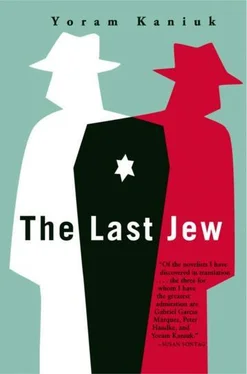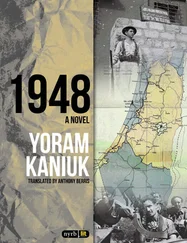Tape / -
Then the things were taken off the wagon and moved to the house that had stood empty ever since the death of the woman nobody had known and by the time they tried to ask her she was unconscious and died. She was buried in the nearby settlement because the idea of death could still be fought and a cemetery of Pioneers looked like a superfluous demonstration of failure. The ruined house was moldy and in the middle of the combined kitchen-bedroom lay a dead dog. Rebecca tried to fix the house and Nehemiah to tile the roof with the help of his friends. The smell of the dead dog remained there a long time. At night, all the men crowded onto the roof, held a bottle of wine they drank because of the sudden cold that replaced the hot wind, and to the sound of monotonous, quiet singing, they finished the roof Nehemiah tried to tile. The Turks who slept in their tent next to the settlement came at dawn with the dogs but the roof was done. Furiously, they tore down some vines, lit a bonfire, and made coffee. When the coffee was ready, one of the Turks poured coffee on his friend. His friend got up and shot him. The corpse lay there with gaping eyes. Rebecca passed by with her swollen belly and saw the dead man. Suddenly she recalled the smell in the ruin and thought, Is that smell the smell of a dog? Then, she said to herself: Now I know who the dead woman was. She hurried to the cart standing there, asked the driver to take her to the nearby settlement, came there about an hour later, went to the Baron's official who was sitting there with a young girl on his lap and listening to music played for him by two pale little girls dressed in white, on flutes, and she said: The name of the woman you buried here was Jane Doe. The official saw before him a splendid woman filled with a fetus, lusted for her but was also disgusted by her, and he said: Who's the woman? And Rebecca said, She lived in an orchard near our city, she was crazy and saw visions, her father was a cobbler who was murdered by rioters, she saw her mother turned into ashes, please write her name on the tombstone, and then she returned to the settlement and with a fluttering heart she wondered why she had done what she did. A jackal who fell in love with one of the bitches who came with the Turks wailed at Rebecca's house, she blocked her ears and tried to return to the river and there was nothing around her but desert and jackals and a smell of Turks and the blood of one Turk still close to the maw of the jackal who had approached the blood and sniffed it eagerly. The yard was full of thistles and thorns and in the summer the snakes would come rustle among the stones. The rain came down and the wind broke the roof tiles. Rebecca said to Nehemiah: Look at the limestone wall of the settlement, you've built a ghetto here. And Nehemiah twisted his face, which was already seared by the sun and was sad like the faces of his comrades and wrinkles were beginning to be plowed on his forehead, and he said: We need a defense, Rebecca, the Land isn't ours yet. And she said: And it won't be, and she turned her face and went to the yard and dug a pit and didn't know why she dug a pit. In the morning, Nehemiah came out and saw the pit, deepened it and said: I'm building an outhouse. He didn't know how to pull up crabgrass any better than to dig a pit. The outhouse he put up collapsed in the first rain. The crabgrass covered the vegetables he planted. The vineyard he was given was the property of IKA. In the summer the grapes would be taken away from him and he would get only a partial payment. Then Nehemiah thought of citrus fruits. The members heard that Nehemiah had an important idea and wanted to assemble, but the synagogue wasn't finished and the members said: How can we live here without a cultural center? They went to one of the abandoned huts and fixed it up and the next night, they called it the "Community Center." They assembled in the "Community Center" and even Rebecca, who was in the last week of her pregnancy, came. Nehemiah talked about citrus fruits, how it would be possible to grow them and market them, how it would be possible to be independent of IKA and the Baron. Nathan and his friend Horowitz went to Jaffa, bought saplings, returned, and planted the first citrus grove, but a deluge came nonstop for three days and three nights and the saplings were crushed and destroyed.
When Rebecca felt the labor pains approaching, she went to Jaffa. A few hours after she came, Ebenezer was born. It was a warm day in early spring and a few days later, Nehemiah came, his face was joyful. He looked at his son, the first son of the settlement, looked at Rebecca and saw her chilly smile and looked at his son again. Doctor Hisin refused to let him hold his baby, but when he looked at his son, he perceived, not how much he looked like him, since the infant didn't yet look like anybody, but how much the baby didn't look like Joseph. He examined every centimeter in his baby's face and was then appeased, kissed Rebecca, and said to her: Suckle the young lion, Rebecca, and she shut her eyes, picked up the infant, and reluctantly began suckling it.
About a month later, her milk was still flowing but her heart was cold. She was returned to the settlement on Saturday night and the next day, the rabbi was brought from the nearby settlement and circumcised Ebenezer Schneerson, and Rebecca stood there and watched the rite of circumcision as if they were circumcising a stranger's child. And around Ebenezer, the first in Judea, stood barefoot houses charred by the beating sun. Rebecca hadn't imagined such a shrill light. She searched for corners of shade and found a baby running around between her legs. Nehemiah's sublime ideas didn't withstand malaria, typhus, and robbers. Heat waves would blaze and the hot wind plowed furrows in the ground that hadn't been worked for hundreds of years. The water was drawn from a nearby well, and when the well was destroyed more wells had to be dug. Trees born beautiful and green looked withered and weary. Rebecca observed her son, her house, and began weeping the tears that had stood behind her eyelashes the day she came to the Land of Israel. Eight years, Rebecca wept nonstop. A very little bit of the ardor of Nehemiah's speech clung to his acts. The house he built listed to the side, the nails would come out on the other side of the wall, the saplings were never planted in time and were never trimmed in time, the water came late to the ditches he didn't know how to dig properly.
The Baron's official, smelling of eau de cologne and wearing charming clothes, came with the Arab workers and the workers uprooted what was left of the citrus fruits. Instead they planted more vineyards. For some time, the synagogue turned into the official's residence. Little girls from distant settlements played a piano there that had been brought on a cart and the playing filled the broad street of the night with a dull melancholy. The flies multiplied feverishly, the pipes rusted, the roofs didn't stand in the wind, two girls from the Galilee went to live with the official in the synagogue and didn't come out of the house for a week. Drunken shrieks were heard even in the distant fields. One night, a flock of vultures was seen waiting for corpses. People were scared and started praying, but there was nowhere to do it. They prayed in the street, in the field, on the carts, in the barns where the cows refused to give enough milk. Nathan went outside and yelled: Not yet, not yet, and Nehemiah went to drive the vultures away with a stick he had cut from a hollow old fig tree that collapsed and died. The vultures didn't flee. Every morning, one of the farmers had to clean the house of the official who kept spitting black watermelon seeds all over. At night, the men gathered and Nehemiah persuaded them to rebel against the official and throw him out. The official discovered that Nehemiah was fomenting a rebellion and incited the farmers against him. At night, Nehemiah was called to the official's house to clean the latrine. Nehemiah refused to go. He was ordered to leave the settlement. Everything was mortgaged and he had no grounds to claim his plot of land. The Arab police came with the Turkish modir and the white-clad official accompanied them. He tried to smile in French. The Turk was hypnotized by the splendid French and kissed him on the mouth. One of his choked girls groaned, Rebecca laughed through her tears and went into the house, looked around, and said: This isn't our house, Ebenezer. Nehemiah and Rebecca packed their belongings, the members stood ashamed but didn't lift a finger. Anybody who dared help Nehemiah could expect to be expelled. At that time, Nathan was in the nearby settlement in the middle of an argument with the local rabbi about the year of shemittah when the land must remain uncultivated and the pointlessness of following its commandments. Nehemiah walked with his belongings to the edge of the settlement and at the collapsed dead hollow fig tree, he built a hut. Nehemiah called the hut Secret Glory after the son of Rachel Brin, and only later on, when the haggling was over and the official dismissed, did Nehemiah return to his house and Secret Glory was forgotten and turned into an area overlooking the path of the cemetery, where the first members of the settlement who died were buried, even though the first dead woman was buried in the nearby settlement, but then Nathan still fought the idea that death could live with the builders of the new Land of Israel. Rebecca went on weeping and in her mind's eye she saw the splendid carts of America and a future full of baskets of flowers and American officials equal to her beauty. Her tears didn't stop even when Nehemiah drove away the vultures, and their improved house was nicer this time and Ebenezer started crawling on its floor.
Читать дальше












